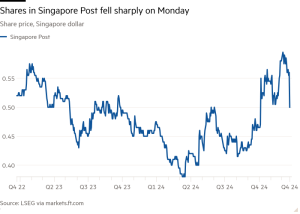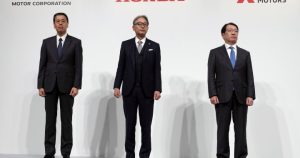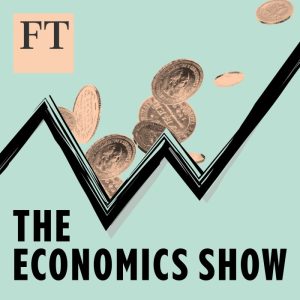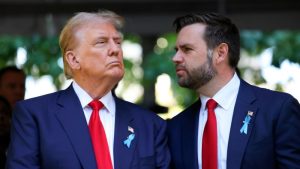Corporate France faces up to new era of political dysfunction
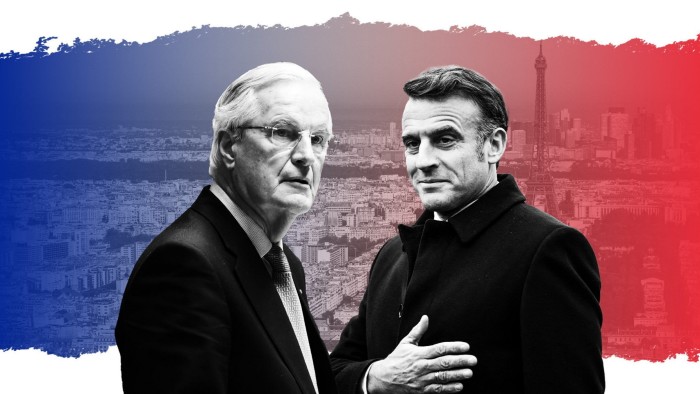
Emmanuel Macron swept to France’s presidency in 2017 on a wave of optimism, promising pro-business reforms and an entrepreneurial outlook that would transform the country’s image as a destination for investors.
But with the government’s collapse last week after a no-confidence vote over Prime Minister Michel Barnier’s deficit-cutting budget, corporate France’s disillusion with the political elite has hit new depths.
“On one side you have the strong performance of French companies, banks and private equity, and across from you is this kind of incompetence from a mediocre French political class with no vision of the common good,” said one lawyer in Paris. “We’re now watching this political suicide play out that is calling into question the viability of opportunities in France.”
The political instability and failure to pass the budget has cast a pall over a slowing economy, extending uncertainty over planned tax rises and grants that frame companies’ strategic planning.
Executives and financiers say last week’s events have exacerbated dysfunction unleashed when Macron called and lost snap elections in the summer, shrinking his political base and fracturing parliament into three groups with no clear majority.

Foreign nationals on the board of one big French multinational watched with bafflement and unease as the far-right and leftist oppositions banded together to topple Barnier, making him the shortest-serving prime minister in France’s Fifth Republic.
One executive at the Cac 40 company said his international board members were “asking for notes and briefings every day” to try to understand the ramifications. “Chaotic situations are not uncommon in France but now we have reached new heights. If you’re French you have some idea what it means. But if you’re a foreigner, investing in France today is very complicated.”
“Is the situation dramatic? No. Worrying? Yes,” the executive added. “But it is certain that before making a big investment in France, we will think about it.”
Patrick Martin, head of business lobby Medef, told the Journal du Dimanche on Sunday that France “had likely already entered a light recession”. Among worrying indicators was that “half of the foreign investors who said they wanted to invest in France have suspended or even cancelled their projects”.
The number of foreign companies making new investments in France has been declining since 2022, according to data from Unctad, when Macron lost the absolute majority he enjoyed in his first term and Russia’s full-blown invasion of Ukraine sparked a European energy crisis. National output is expected to slow from 1.1 per cent in 2024 to 0.8 per cent next year while unemployment, which had fallen under Macron, is expected to tick up to 7.7 per cent.
Another Paris executive who works closely with Medef said small and medium-sized companies were pausing decisions on investment and refinancing, hoping to wait out higher borrowing costs after French 10-year sovereign spreads against Germany’s benchmark Bund in recent weeks hit highs not seen since Europe’s sovereign debt crisis before falling back.
One Paris-based investment banker said last week’s events would not immediately hit activity but could worsen appetite for investments in France, likening the effects to “a slow poison”.

Since the dissolution, mergers and acquisitions have yet to take a hit relative to a year earlier, according to data from Dealogic. But activity has been sluggish since the president’s re-election in 2022 — halving from a peak above €100bn in 2021 to roughly €47bn this year.
The slide into dysfunction has been marked by a growing disenchantment with the political class among France’s business leaders.
The Paris-based lawyer said the government’s collapse showed that for all Macron’s pro-business promises, the president was “just as self-interested and short-sighted” as other French politicians.
Business leaders were critical of Barnier’s now-defunct budget, which sought to reduce France’s deficit largely through tax increases rather than by tackling thornier issues such as inefficiencies in public services and government bureaucracy.

“We save pennies in a country in which we are the most taxed in the world . . . while taking away companies’ means to invest in France, including for French companies,” billionaire tech and telecoms investor Xavier Niel told the Financial Times before last week’s no-confidence vote. “I find it incredibly counterproductive.”
At an electricity industry event on Tuesday, energy chiefs also took aim at France’s regulations. Luc Rémont, head of energy powerhouse EDF, told a meeting of the Union of the French Electricity Industry: “It’s hell to invest in France for regulatory reasons,” while TotalEnergies’ Patrick Pouyanné added: “I can’t keep investing in a country where I have to have so many people costing me money for such a weak return.”
For entrepreneurs, the impression was that “start-up has become a bad word”, said Philippe Corrot, chief executive of French ecommerce platform Mirakl — a stark contrast to the image of a start-up nation espoused by Macron’s early administration.
Corrot has also grown increasingly alarmed by the anti-economic rhetoric coming from some of France’s leftwing parties. “These people don’t understand anything about business,” he said. “They think jobs are created by the government.”
The political fracas is taking place against a weakening economic backdrop. A number of French companies have recently announced lay-off plans that amount to thousands of job losses, including at tyremaker Michelin and food retailer Auchan. While not directly linked to France’s political impasse — particularly for Michelin, which serves the ailing global motor sector — the changes reflect unease in the economy.
Business bankruptcies have risen since Macron’s dissolution of parliament in June to hit 64,650 in the 12 months to October, 21 per cent higher than a year earlier, according to provisional figures from the Bank of France.

“You have complicated macro elements — war, problems in the auto sector — add to that political and fiscal instability, and it will accelerate certain situations,” said one restructuring specialist.
Markets have calmed in recent days after French borrowing costs briefly surpassed those of Greece. But Cac 40 stocks have traded at a discount to UK and German peers since Macron called the snap elections in June.
“It’s like a slow-motion car crash,” said Charles-Eduard van Rossum, president of boutique M&A advisory firm Ravel & Co, who nevertheless remains optimistic about the strength of French businesses and the economy if the political upset can be contained. “Any strategic operation involves risk so if we shake up the parameters it can lead to boards and managements hesitating or postponing decisions, at least, if not cancelling completely.”
The situation could affect Safran, the Cac 40 jet engine and defence manufacturer that is in the process of weighing options for a new site in France, Canada or the US that is due to be announced in the first half of 2025.
“When we invest somewhere, we prefer to go to a place with a certain political and economic stability,” said chief executive Olivier Andriès.
As the country waits for Macron to appoint a new prime minister, none of the political options — whether a new minority government or a technocratic administration — hold wide appeal in business circles. But the consensus is that it will set a dangerous precedent if Macron submitted to the drumbeat of opposition calls to step down ahead of the end of his term in 2027.
Macron has dismissed suggestions he might step aside as “political fiction” and has vowed to see out his term.
The more optimistic retain hope that the moderate left could be persuaded to join a broad alliance spanning the centre and moderate right that could hold until fresh elections next summer. But a budget still needs to be voted through, which could prove a new stumbling block.
“We have arrived at the real consequence of the June-July legislative election, which is a total inability to decide anything,” said one senior French banker. “The worst is coming to pass.”
#Corporate #France #faces #era #political #dysfunction


